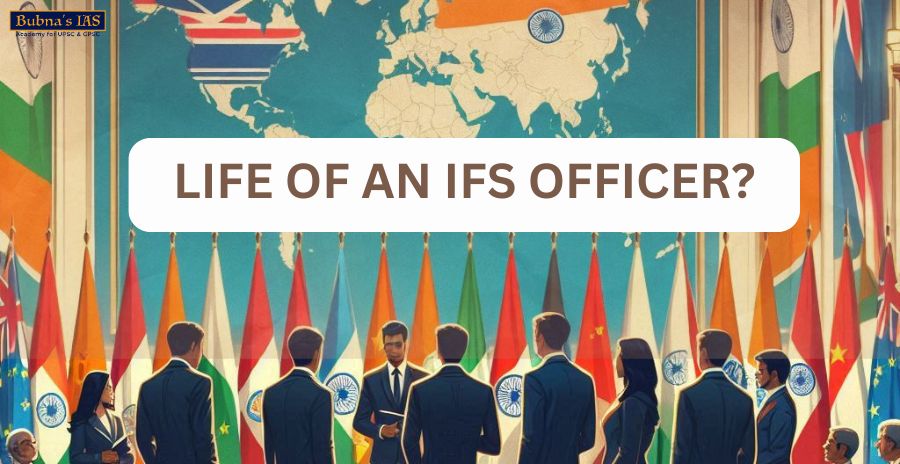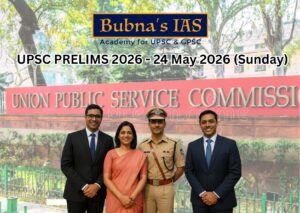Life of an IFS Officer: A Glimpse into the World of Diplomacy
Becoming an Indian Foreign Service (IFS) officer is a dream for many UPSC aspirants. The life of an IFS officer is often associated with prestige, travel, and a unique opportunity to represent India on the global stage. But beyond the allure of diplomatic passports and international postings, the life of an IFS officer is filled with challenges, responsibilities, and constant learning. In this article, we will explore what it means to be an IFS officer, from the training and postings to the everyday tasks and long-term career prospects.

Introduction to the Indian Foreign Service (IFS)
The Indian Foreign Service (IFS) is the diplomatic arm of the Government of India. IFS officers serve in Indian embassies, high commissions, consulates, and multilateral organizations around the world. Their primary role is to promote and protect India’s national interests abroad. This can involve diplomacy, trade negotiations, consular duties, and representing India at international forums such as the United Nations.
IFS Officer Life: Training and Induction
The life of an IFS officer begins with rigorous training. Once selected through the UPSC Civil Services Examination, the officer undergoes foundation training at the Lal Bahadur Shastri National Academy of Administration (LBSNAA) in Mussoorie, alongside other civil service officers. This is followed by specialized training at the Foreign Service Institute (FSI) in New Delhi.
Foreign Service Institute Training:
- Diplomacy Skills: The officers are trained in the art of diplomacy, international relations, and foreign policy.
- Language Learning: Proficiency in at least one foreign language is mandatory. Officers are trained in languages such as French, Spanish, Arabic, Mandarin, or Russian, depending on their future postings.
- International Exposure: Officers are sent on study tours to Indian missions abroad to get a firsthand understanding of their roles and responsibilities in foreign nations.
- Protocol Training: Officers are trained in etiquette and protocol, essential skills in diplomatic circles.
Roles and Responsibilities of an IFS Officer
An IFS officer has a multifaceted role that evolves throughout their career. They represent India on multiple fronts—political, economic, cultural, and even military matters. Here are some key responsibilities:
- Diplomatic Relations
An IFS officer is tasked with managing India’s bilateral and multilateral relationships. Whether it’s negotiating treaties, addressing bilateral issues, or attending high-level meetings, they work to maintain and strengthen India’s position in the international community.
- Economic Diplomacy
Economic diplomacy involves promoting trade, attracting investments, and enhancing economic cooperation between India and other countries. IFS officers work with Indian businesses and investors, fostering opportunities for trade and economic growth.
- Cultural Diplomacy
IFS officers promote Indian culture and heritage abroad, organizing cultural events, exhibitions, and exchanges that highlight India’s rich traditions. Cultural diplomacy strengthens ties with other nations and fosters goodwill.
- Consular Services
An important part of an IFS officer’s job is to provide consular services to Indian citizens abroad. This includes issuing visas, helping Indian nationals in distress, and managing issues like passports, emergency evacuations, and more.
- Representing India at International Forums
IFS officers represent India in international organizations such as the United Nations, the World Trade Organization (WTO), and other multilateral platforms. They articulate India’s stance on global issues such as climate change, human rights, and international security.
A Day in the Life of an IFS Officer
Credit : India Knowledge Network
The daily life of an IFS officer varies depending on their posting—whether they are in India, in a foreign embassy, or at an international organization. However, here’s a glimpse into a typical day for an IFS officer:
Morning Briefings:
Most mornings begin with briefings and reports. IFS officers keep themselves updated on global and regional developments that affect India’s interests. They often start their day by reading through diplomatic cables, news reports, and policy briefs.
Diplomatic Meetings:
Meetings with counterparts from foreign governments, international organizations, or business delegations are a regular feature of an IFS officer’s day. These meetings can range from high-level discussions on trade agreements to negotiations on political or military cooperation.
Event Planning and Cultural Diplomacy:
Organizing and attending cultural events, seminars, and diplomatic receptions is a regular part of their job. These events help build rapport with host countries and promote Indian culture and values.
Consular Duties:
On the consular front, an IFS officer might deal with a wide range of issues, such as helping distressed Indian citizens, attending to visa applicants, or assisting with matters related to international law.
Travel and Exploration:
IFS officers are required to travel frequently, both within the country of their posting and internationally. They might travel to participate in international conferences or to handle diplomatic matters in different cities.
Life Abroad: Challenges and Perks
One of the defining aspects of an IFS officer’s life is their postings abroad. They typically serve at various Indian embassies, high commissions, or consulates in different countries for 2-3 years at a time.
Challenges of International Postings of IFS:
- Cultural Adaptation: Adjusting to new cultures, languages, and customs can be a challenge, especially when posted in vastly different parts of the world.
- Family Life: For officers with families, managing education and healthcare in foreign nations, along with adapting to frequent relocations, can be difficult.
- Security Concerns: In certain countries or regions, IFS officers face security challenges, including political instability or hostility towards foreign diplomats.
Perks of International Postings of IFS:
- Prestige and Diplomacy: Representing India on a global stage is both an honor and a responsibility, making the role of an IFS officer highly prestigious.
- Cultural Exposure: IFS officers get to experience different cultures, languages, and traditions, providing them with a rich personal and professional life.
- Networking: Officers build vast global networks with other diplomats, international organizations, and business leaders, which can prove useful for India’s diplomatic interests.
Career Growth and Promotions of IFS
The life of an IFS officer is a long and fulfilling career, with opportunities for growth and advancement. Typically, an IFS officer’s career progresses through various grades:
Junior Level:
At the start of their career, an IFS officer works as a Third Secretary or Second Secretary in Indian embassies. This is a learning phase, where they get hands-on experience in diplomatic duties.
Middle Level:
After promotions, officers move into roles like First Secretary or Counsellor. They take on more responsibilities, leading specific departments within an embassy or handling more complex bilateral negotiations.
Senior Level:
At the senior-most levels, IFS officers serve as Ambassadors, High Commissioners, or Permanent Representatives to international organizations. They are responsible for leading the entire diplomatic mission in a country or at an international organization, with the backing of a dedicated staff.
Conclusion: A Unique and Fulfilling Career
The life of an IFS officer is unique, challenging, and incredibly rewarding. From influencing global politics to promoting Indian culture, they represent India on a global stage and make a significant impact on international relations. The journey is not without its challenges—frequent relocations, cultural adjustments, and high expectations—but the prestige and honor associated with this career are unparalleled.
For anyone aspiring to serve the country in the sphere of diplomacy, the IFS offers an exciting and fulfilling path. With a mix of travel, global exposure, and the opportunity to contribute to India’s growth on the world stage, the life of an IFS officer is truly one of service and significance.
FAQs: the Indian Foreign Service (IFS)
It occurred to me recently that the last time I wrote a post with FAQs was before I went to Mussoorie for the Foundation Course and that it was only focused on the Civil Services Exam. I have received many questions over the last three and a half years about the IFS and since I haven’t written in a while, this seemed like a good place to start. I have put together the top 10 questions that almost everyone seems to have regarding the IFS.
First blog post of 2019 and hopefully a useful one, so here it goes…
Q.1. Do IFS officers stay posted abroad all their lives?
A.1. Not really. There is no strict rule that makes officers stay abroad throughout their career. In fact, a balance is encouraged, and even necessary for promotion in higher posts. There are officers who have served abroad for more than 75% of their career, while many have done the reverse. There are benefits to having a balance: serving abroad is a great experience and an opportunity for exposure to the way the world outside India works. It is the unique opportunity to represent the country and its people and, when needed, defend its goals and policies. Serving at Headquarters in the Ministry of External Affairs allows an officer to be at the heart of foreign policy making. It helps one build their personality and reputation, which is important in the IFS considering that it is such a close knit service where word travels fast.
Q.2. Is the pay in the IFS good enough to lead a comfortable life?
A.2. This is the question that nearly everyone has asked me at some point; some have taken the liberty to even ask me what my salary is. To set the record straight, it is considered to be very inappropriate to ask someone their salary, and so I have not answered with any numbers. But I can assure you that when posted abroad, IFS officers are paid well and it is possible to lead a comfortable life, even in expensive places like France or the US. Medical expenses and education of upto two children are also taken care of by the government. When posted in India, we are paid as much as any other officer of our rank in any other service, particularly the IAS, with whom we enjoy pay parity.
Advertisement
Q.3. You spoke about facing racism, how bad is it? I am reconsidering my choice of opting for the IFS because of this.
A.3. This was a query that came from many people after my last post. Yes, racism exists and sometimes it is overt, as I once experienced during a trip to Vienna, and other times it is subtle, like my experience here in the US. But this happens once in a blue moon and is not a regular feature of the job, so to be honest it isn’t worth changing your mind, if the IFS is really something you want. Besides, discrimination of various kinds exists even in our own country and no matter which service you join, there will be some sort of exclusion that you might face. For example, ‘service X is better than service Y’, or ‘you can’t do this job because you’re a woman’, or ‘oh this person must have gotten this posting because of his/her connections (or the lack of it)’. Being thick skinned is an essential attribute for a Civil Servant and someone else’s ignorance and bias shouldn’t prevent you from pursuing a job you want or might be good at.
Q.4. Which is the best Compulsory Foreign Language (CFL) to opt for?
A.4. This is going to be a long answer. I would like to believe it’s French because it is my CFL, but the honest answer to that question is that there is no single language that is the best for one’s career. I think being a good officer overrides everything else. Chinese speakers are doing postings in Europe while a French speaking ambassador has been sent to China. What has worked here is that these are talented officers. I was always interested in the Chinese language and India’s relations with China, but I visited China on a mission attachment and just didn’t feel the vibe. After much thought I decided to place German as my first preference and French as my second, knowing well that I would get French because the topper of the batch decided to take the only German spot. And what a great decision it was! I reached France and started speaking fluently within a month thanks to my prior knowledge of the language. It helped me greatly in my work as an officer in the Press, Information and Culture wing and then again in the Political Wing. And Paris is an amazing city to live in.
My first posting was thus a great success on all fronts: I did well at my language, at work, made some great friends and finally got the opportunity to become an interpreter for our senior dignitaries. My advice to anyone in a dilemma would be to decide based on what you want from your initial few years because the CFL may determine the first posting after your language is done, but after that it is your hard work that will matter. Don’t opt for a language that is too hard for you, because doing well in your language is becoming increasingly important as the Ministry sees value in officers knowing the host country’s language well and everyone has different linguistic abilities.
Q.5. Do I need to have good English to do well in the Foreign Service?
A.5. Knowing any language is an asset since it widens your capability to communicate and communication is an essential part of the job of a diplomat. Having said that, do remember that the CSE anyway has a compulsory English qualifying paper. So if you make it to the Civil Services it is because you already have a basic knowledge of English. In the IFS what matters more and more is analytical skill and the ability to express it. You may not speak like an Oxbridge pass out but if your reports and written work shows this skill, it can take you far. The IFS gives everyone the opportunity to put their unique skill set to good use and contribute to governance. Good English won’t be of any use if a person is not a good officer and conversely for a talented officer even basic English skills can do wonders. The important point here is to be open to learning new things. That is after all, the essence of the job.
Q.6. What if you get posted to Africa? You seem like someone who likes comfort, how will you adjust?
A.6. Some people have made the casual assumption that I’m incapable of surviving under harsh circumstances and that I only want to do comfortable postings in Europe and USA. I hope it’s not because I’m a woman. Either way, let me dispel the myth that postings in Africa and West Asia are extremely harsh. Every posting has its own set of challenges, but I know for a fact that the government takes good care of its officers in hard postings as well. There are several advantages to such postings, I have been told. Even in developing countries, IFS officers interact only with their counterparts in the host government, have comfortable housing, transport and pay, and have an interesting work profile.
As for my postings, Paris was a regular posting that any trainee goes through for their CFL. California happened because of my language skills and I was sent here to do a course along with other colleagues who are studying interpretation in other languages. I was at the right place, at the right time and with the right skill set, like my other colleagues, so nothing special about it.
And speaking of survival, if IAS and IPS officers can survive in Maoist hit areas, I’m sure I can do fine in an African or West Asian capital.
Q.7. Do IFS officers get cars, big houses and servants like the IAS?
A.7. We get good houses when posted abroad and we are able to save enough money to buy a good car. If we go out for meetings, then an Embassy/Consulate vehicle is available in case the officer doesn’t have a personal car. We get diplomatic license plates even on personal cars. As for servants, it is a luxury of the developing world that doesn’t really exist in the West. But again, our pay allows us to hire local help as and when needed. I am actually glad that I didn’t have any domestic help in Paris because I taught myself to cook. If I had full time help I never would have bothered. I feel rather empowered and self sufficient thanks to this because everyone in my family thought I was incapable of cooking and would die of hunger.
Q.8. Is there a lot of political interference in the IFS as there is in the IAS and IPS?
The political interference is certainly not as high as in the IAS and IPS. These services interact with politicians on a daily basis, whereas we do it barely once or twice a year at junior levels.
Every political executive has a certain orientation and varying priorities and it does affect our work but in more subtle ways. But this is felt only at senior levels and not so much at the level of Under Secretary or Second Secretary. I have not experienced it yet. But I think in the era of social media, political interference affects every public servant, irrespective of service and government, because everything today is political.
Q.9. Do I need to know a foreign language to be in the IFS?
A.9. No. But officers are supposed to learn a foreign language once they join the service.
Q.10. How often can I visit India when posted abroad?
A.10. Like any job in government, it depends on your boss. Every government official gets 30 days Earned Leave and IFS officers get 15 additional ELs each year when posted abroad. But whether or not you can take those leaves depends on your boss. I have been lucky so far and had compassionate bosses who understood the difficulties of my personal life since my husband is in the IAS, posted in India and had difficulties with getting leave. While he got to visit me once since we got married, I have visited him in India six times now.
I think I have covered the most common doubts that IFS aspirants have and I hope readers find this useful. In case there still are some doubts, readers can leave a comment.
We Prepare the Best IAS, IPS, and IFS Officers in Surat
At Bubna’s IAS, we are proud to be the leading IAS, IPS, and IFS coaching institute in Surat, dedicated to helping aspirants achieve their dreams of joining the prestigious Indian Civil Services. Our comprehensive training program ensures that students receive the best guidance, resources, and mentorship to crack the UPSC examination and become top-notch IAS, IPS, or IFS officers.
Why Choose us for IAS, IPS, and IFS Coaching in Surat?
- Expert Faculty
Our highly experienced and qualified faculty members specialize in UPSC preparation, providing personalized guidance tailored to each student’s needs. - Comprehensive Study Material
We offer meticulously crafted study materials, current affairs resources, and mock tests that cover the entire UPSC syllabus, helping students master both the prelims and mains. - Mock Interviews and Personality Development
We prepare our students not just for the written examination but also for the interview stage. Our mock interviews and personality development sessions are designed to boost confidence and sharpen communication skills. - Result-Oriented Approach
With a proven track record of success, our result-oriented approach focuses on building analytical thinking, problem-solving skills, and in-depth knowledge of subjects. - Flexible Timings and Online Classes
We offer flexible batch timings and online classes, ensuring that students can learn at their convenience without compromising on quality.
Join the Best IAS, IPS, IFS Coaching in Surat
If you’re serious about clearing the UPSC exam and making a mark in civil services, join Bubna’s IAS in Surat. Let us guide you on your path to success in becoming an IAS, IPS, or IFS officer.







